watch now!
A place where I discuss all things related to toddlers and motherhood!
Subscribe to my Youtube channel
As a clinical psychologist, published author, and mother to two cheeky young children, I get it. I’ve spent YEARS researching and filtering through the noise online, so you don’t have to.
PARENTING TIPS
POTTY TRAINING
ANTIRACISM
PLAY
Blog Topics
SIBLING RIVALRY
SCREEN TIME
TANTRUMS
DISCIPLINE
Hi I'm Dr. Jazmine
How to Stop Yelling at Your Kids and Being an Angry Parent
topics:
Let’s talk about yelling because we’re all feeling crispy – aka burned out.
A couple of weeks ago, I did a story about the assumptions you all had about me. One of the big assumptions was, “I assume you don’t yell at your kids.”
I’m like, “Oh, girl, no. Yes, I do.” It happens even to me, a clinical psychologist.
I always like to say even the calmest parent is going to lose their cool. The biggest thing for me is I really believe that since I know I don’t need to be a perfect mom.

Not to say it’s okay to just go off on your kids all the time – of course not – but I know that there is power in recognizing that it’s okay for me not to be perfect.
I don’t need to have all of it together. That’s powerful for me as a mom. It’s also powerful for me as a psychologist and the work I do. Giving myself the grace and the permission to be imperfect, it’s powerful. And I hope it inspires you as well.
That’s why I’m loving that we’re starting this crispy movement because even if we are struggling, we’re on the struggle bus together.
And we can come together and talk about it. Because if we’re not talking about it, we’re not healing. We’re not changing.
None of us are perfect, not even me.
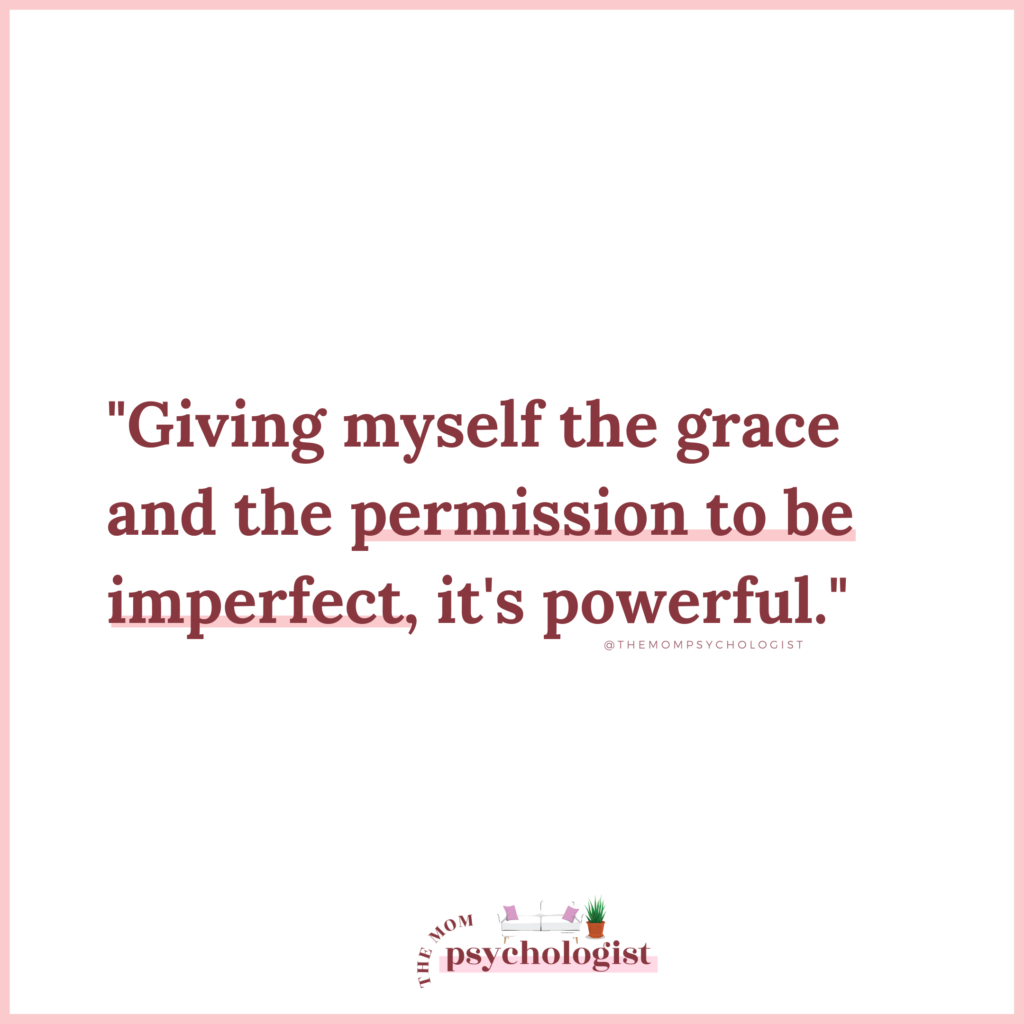
So why do you yell at your kids? Let’s talk about triggers.
In terms of yelling and losing your ish (“anger management” or whatever you want to call it), first, you need to start with your mindset.
So, for example, a big thing for me is I’m a recovering control freak. A trigger that causes me to lose my cool and yell is that I feel like I don’t have control anymore. That I’m out of control or my kids are out of control, and it’s my job to put them back into control.
Other triggers are also feeling disrespected, unheard, and like I’m not being validated. Those are all big yelling triggers for me.

So the first thing is identifying your mindset and your triggers. I want you to take an inventory of your triggers.
And, yes, I want you to do it right now.
I don’t want you to just consume this information and move on. Take this as an invitation to identify and dissect your triggers because that’s where the work starts – being aware of your triggers.
So grab a paper and pen because I want you to take a moment and write this down.
In the last week…
- What has caused you to lose it?
- What has resulted in you yelling?
- Remember the last time you felt guilty about the way you parented? What was going on at that moment and/or right before that moment?
Your answers to these questions are the triggers that push you into the angry, yelling parent zone. It can be so powerful when you identify your triggers because you now know what to watch out for.
But how do you stop yelling or feeling angry with your kids? Make a plan!
Now that you know your triggers, it’s time to come up with a plan on how to keep calm during these emotionally charged moments.
When you feel triggered…
- How can you “catch my calm”?
- How can you bring yourself back down to baseline?
- What are the things that bring you peace, that make you feel grounded, that make you feel more like yourself?
Try Journaling
For me, that is journaling. Journaling is huge in terms of re-centering myself and bringing more mindfulness and insight into my processes.
Try out journaling to see if it helps you process through the moments you wanted to yell or became angry with your kids.
But you can’t always journal when you’re in parent mode, so…

Try Taking a Break
In the moment of high emotions, try taking a break.
When I am feeling heightened and triggered, I need space. I need quiet. For me, that often looks like going outside to the backyard, going to the bathroom, or saying, “Hey, hubby, I’m going to go upstairs real quick. Can you watch the girls?”
Try Mantras
Also, try resetting your mindset and telling yourself a positive mantra to bring you back to a calm mindset.
Here are some example mantras:
- This is not an emergency.
- They’re not trying to give me a bad time. They’re in pain right now.
- I don’t need to fix this.
- This is not my battle to try to win.
- This is their feelings to feel, and feelings are good.
- They can have their own emotions.
These positive mantras are helpful because often, when you feel triggered, your mind races in with all these negative thoughts. “Make it stop. Why are you acting like that? I’m getting so angry. I’m such a bad mom because I’m getting so angry. Why can’t I calm down?”
Instead, shift to notice your thoughts and see that you’re triggered.
A mindset shift of your internal monologue is powerful to help combat yelling and feeling like an angry parent.
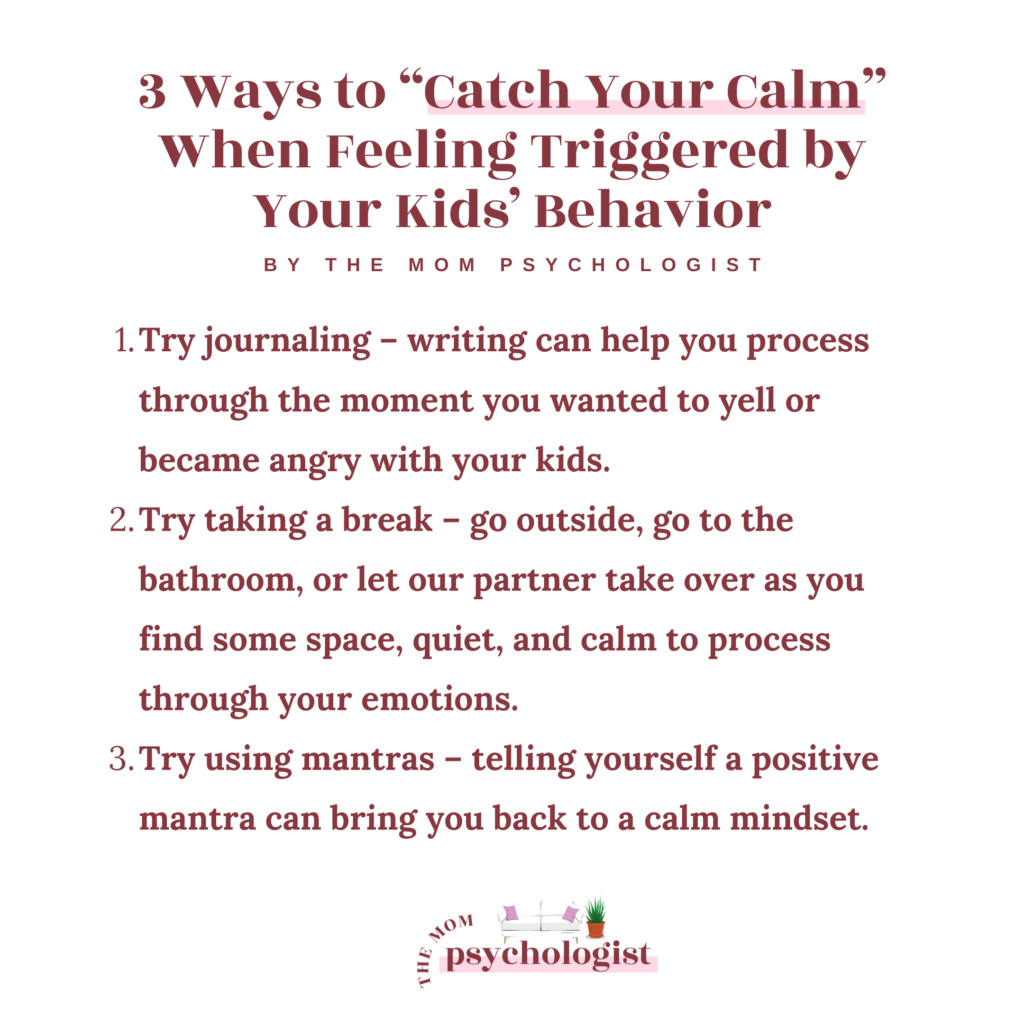
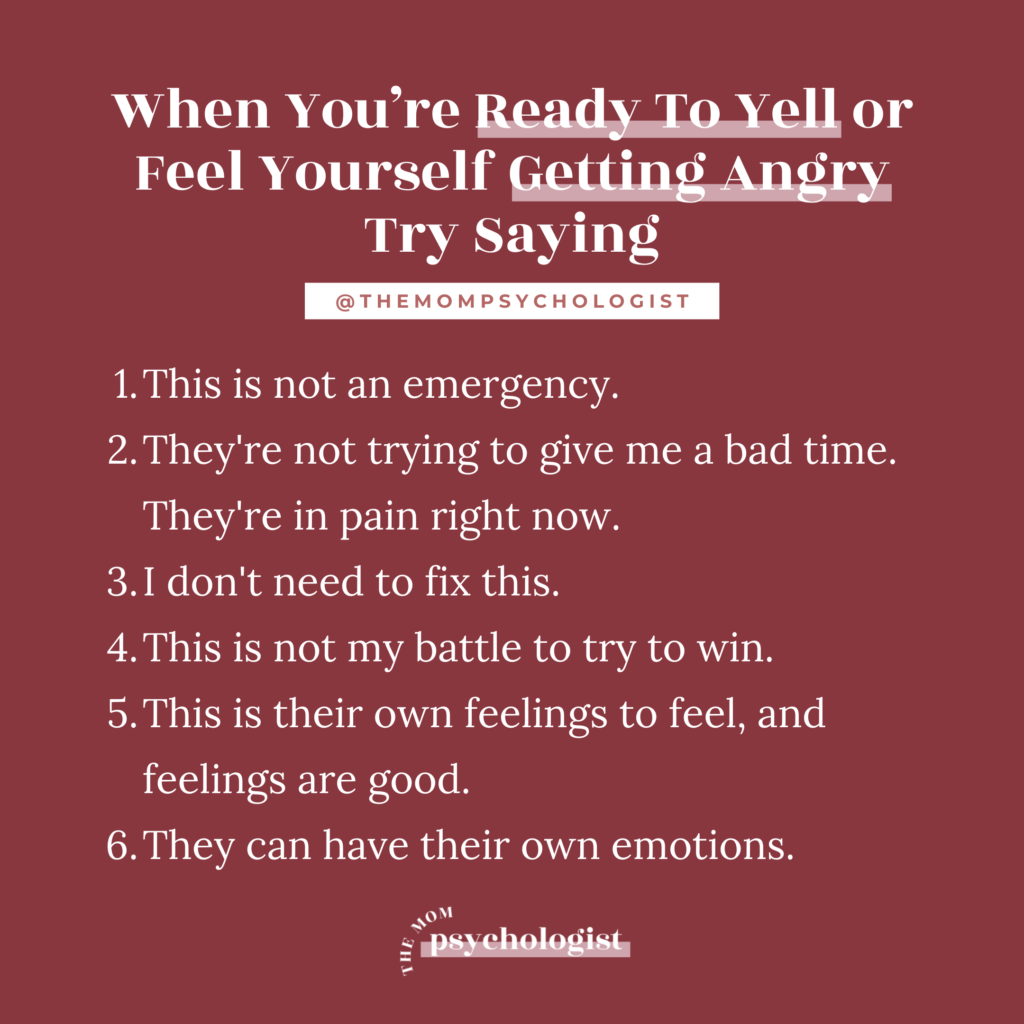

How can you handle specific kid behaviors that trigger yelling?
How can you handle specific kid behaviors that trigger yelling?
Another way that helps with yelling and feeling triggered is coming up with a good plan for some of the common behavioral issues you face.
Even if you think everything is random, I invite you to make a list because I’m sure there are patterns.
Make your list and then come up with a specific plan of action.
Think about…
- What in the last week have you been struggling with when it comes to behavioral issues?
- What things make you feel like you don’t know what you’re doing, like your child’s not listening, or you don’t feel confident in how you’re responding?
For instance, instead of trying to wing it, you say, “The next time my kid refuses to brush their teeth, I’m going to do this. I’m going to say that.”
Having a concrete plan can help you feel prepared for these moments.
But if you’re thinking, “That’s great, Dr. Jazmine, but I don’t have a plan for a lot of the things that I’m dealing with right now.”
If this is you, I would encourage you to check out my free discipline workshop, How to Get Your Kids to Listen Without Yelling, for a deeper dive into discipline and setting consequences with intention and respect.
When it comes to parenting and discipline, consistency is clutch.
So you try some of these tips or read a parenting blog/book or watch a video, and you go try what you learned out.
But you only try it once or twice.
You’re like, “Oh, this doesn’t work. They don’t know what they’re talking about. They don’t know my kid. They don’t know me. It doesn’t work.”
Remember, it takes 21 days to make a habit. I challenge you to stay consistent with discipline and with your strategies and plan.
Nothing is going to work the first or second time.
It’s like going to the gym. When you work out, you don’t expect the next day to lose a bunch of weight and to see improvements in your body. You know it takes time and consistency.
It’s the same for discipline.
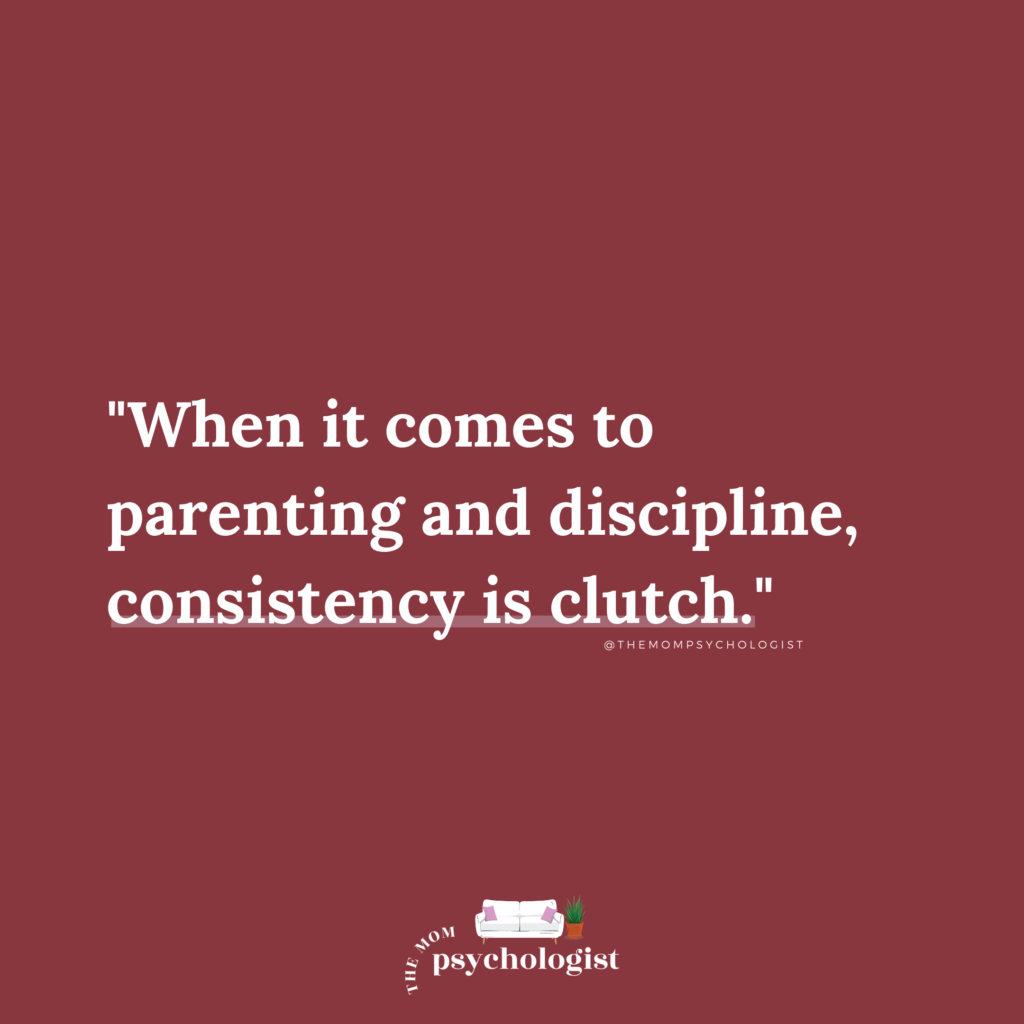
Don’t forget to practice compassion for yourself when parenting.
Having self-compassion makes it less likely that you’re going to yell. The more you beat yourself up for being human, the more you beat yourself up for making parenting mistakes, the more likely you’re going to continue the cycle of yelling and angry parenting.
It starts with having compassion for that part of yourself that’s crispy – that’s exhausted.
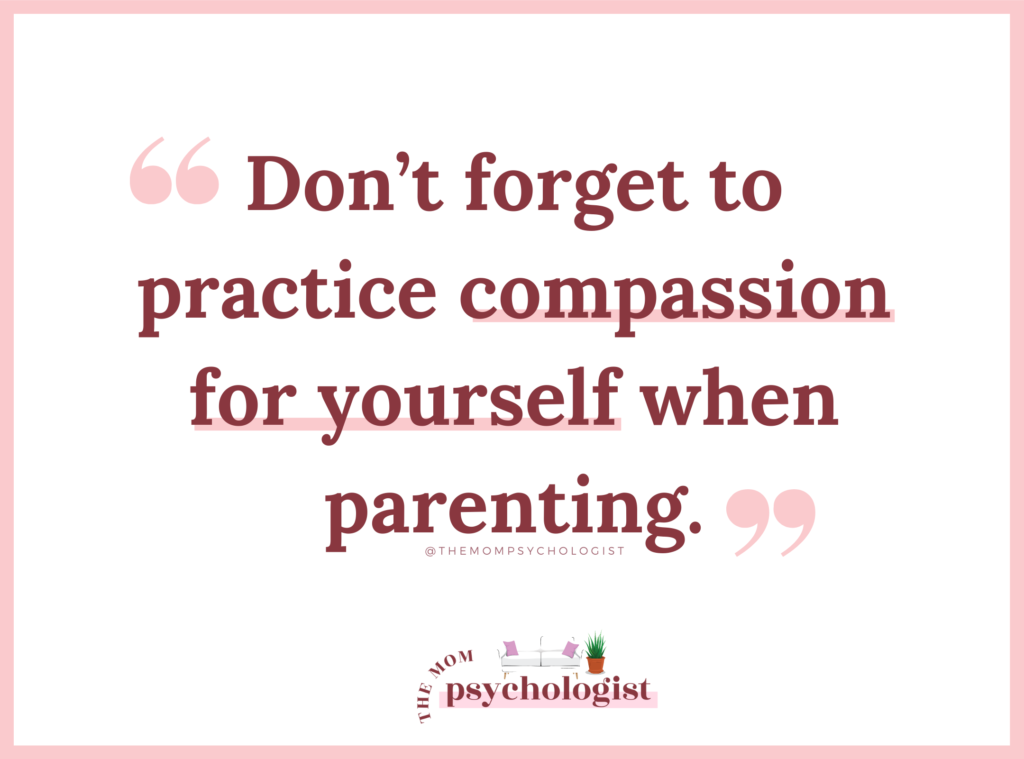
Offer compassion toward that part of yourself that is feeling deflated because that’s where you’re going to get nourished and heal.
There is power in self-compassion.
After yelling, don’t forget to repair your relationship with your child.
If you’re wondering about how to repair ruptures with your child after they happen, I have a whole video that walks you through the process of what to do after you yell because the repairing process is key.
You don’t want to miss this step. At the time, you feel guilty and then you try to sweep it under the rug and move on.
But you don’t want to do that.

As much as possible, you want to repair with your child and repair with yourself.
To repair yourself, you need to practice self-care. I know self-care sounds played out – I actually don’t like the word – so let’s start a new word, like the anti-crispy starter pack.
Having a good anti-crispy starter pack of things that you do consistently to take care of your body and mind is crucial.
I know you’re probably going to roll your eyes when you read this, but don’t forget the basics. As much as possible, get a good amount of sleep per night, eat healthy foods, and drink lots of water (it doesn’t have to be 100% perfect, but as much as you can).
Here’s to less yelling and less angry parenting!
Remember, you can start today being the parent you want to be.
So figure out your triggers and get your plan in place to start becoming a calm, happy parent.
Drop me a comment below about your triggers, your plan, or questions you have. I’d love to hear about your journey.
Rooting for you,
Dr. Jazmine
P.S. If you haven’t already, don’t forget to check out my free discipline workshop, How to Get Your Kids to Listen Without Yelling, for a deeper dive into discipline and setting consequences with intention and respect.
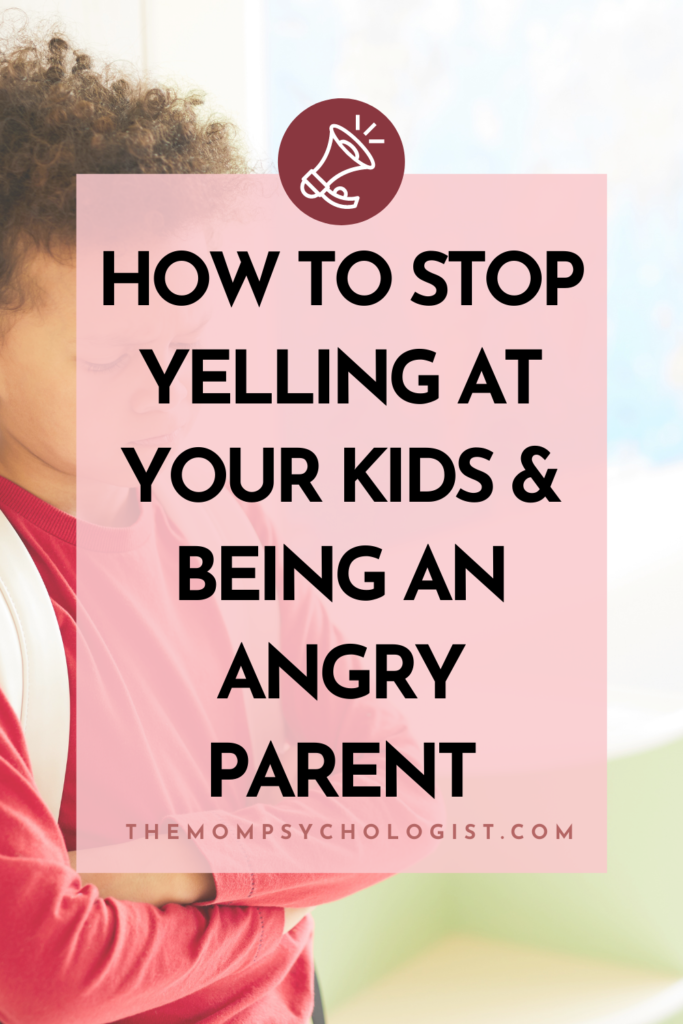
Leave a Reply Cancel reply
Copyright The Mom Psychologist® 2025
grab my free script pack!
explore
work with me
information
About
Blog
YouTube
Podcast
Privacy Policy
Terms of Use
Product Disclaimer
Contact
TMP Times (Newsletter)
[…] Source: 🔗 […]
Is it too late to use this with teenagers? I want help stopping. My kiddos are 14, 12 and 8.
Im so angry at my kids and myself. All I do is yell and scream. The kids ages 11 16 will not listen to me. Getting them to do anything is an argument. Very negative and emotional environment. Please help me. I’ve lost myself and I can’t find her…thanks
I know this was last year, but how are you doing now? & what helped you manage your stress. I’ve been dealing with stress for so long it’s turned into anger on top of life and moving into our apartment my kids fight all day long mind you they are 12 & 6 yrs old two girls. & I find myself snapping and having to apologize often.
Yelling all the time at my 13 year old daughter about the same things over and over. One would think that she would take certain steps to avoid the fact that it’s the same crap and she’s going to get yelled at; she just knows how to push my buttons. I love her so much but at the same time , I don’t want to parent anymore, that’s how I feel at the end of the day when it’s the same crap over and over. I ask myself.. why..? No sorry no explanation, a roll of the eyes, and it’s an attitude face like she just doesn’t have a care in the world. No respect and I’m just over it… I’m at my wits end of what to do. I want to throw my cards in…
So the way to stop yelling is to come up with a plan to stay calm… No details on how to do that at all. If I knew how to stay calm I would already be doing that. What a waste of five minutes spent reading this.
Just reading this I have tears in my eyes. Feels like a pep talk and a warm reassuring hug I needed. Good to know I’m not alone and that I create a better environment not only for me but my child.